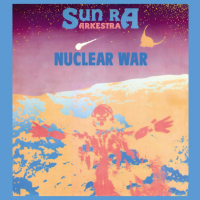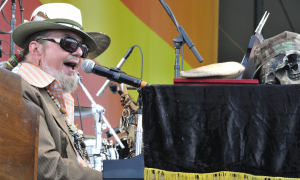Home » Jazz Articles » Jazzmatazz » Sun Ra Nuclear War: A Smooth Soundtrack to the Apocalypse
Sun Ra Nuclear War: A Smooth Soundtrack to the Apocalypse
 With threats of our impending doom through nuclear hellfire seemingly increasing by the day. I thought it would be the perfect opportunity to talk about one of my favorite Sun Ra songs, "Nuclear War." A song so smooth and hilarious it almost makes you welcome the apocalypse.
With threats of our impending doom through nuclear hellfire seemingly increasing by the day. I thought it would be the perfect opportunity to talk about one of my favorite Sun Ra songs, "Nuclear War." A song so smooth and hilarious it almost makes you welcome the apocalypse. "Nuclear War" was released twice, initially on the 1982 album of the same name, and then a second time a year later on A Fireside Chat with Lucifer since on both albums it was paired with the song "Retrospect." I'll discuss that track as well. "Nuclear War" starts with an electric piano introduction, that sets up the basic rhythm and chords for the song. In comparison to much of Ra's work, the instrumentation for this piece is incredibly bare bones. The song only features Ra's electric piano and Samarai Celestial's drums, in contrast to Ra's often bombastic horn parts.
Ra probably used such simple instrumentation to ensure the focus would remain on the lively, bluesy, call and response chants between Ra and his Arkestra.
The track has an excellent mid-tempo dance feel that makes the vulgarity and dark humor go down easier. Even with the vulgar lyrics, I would still consider this one of Ra's more accessible songs. The track starts out with Ra singing "Nuclear War? Nuclear War / They talking about Nuclear war." The Arkestra responds to each "War" with a tepid zombie-like "yeah." This creates a striking contrast between the lackadaisical vocals and the morbid subject matter.
Then Ra adds more detail, describing nuclear war as "motherfucker don't you know" something that none of us will disagree with. Then the chant finishes with "if they push that button, your ass gotta go" The Arkestra again offering dispassionate comedic backing vocals.
For the next six minutes, we hear variations on this basic chant, with Ra talking about the different aspects of nuclear war. From the effects of the explosion blasting you "so high in the sky, you can kiss your ass goodbye," the burnt trees and grass caused by the hellfire, and the mutations caused by the radioactive fallout.
Most songs talking about how our impending doom could come in three seconds would sound menacing, but Ra's delivery and the light funk backing keeps it from feeling bogged down. Ra's keyboard comping and Celestials slight variations on the beat also help keep the song from feeling repetitive despite the long-time stamp. The backing call and response vocals shift from going "yeah" to repeating Ra's lines. The majority of the track features Ra and the Arkestra riffing on the main chant, with variations in energy and phrasing.
My favorite part of the song is at 4:22, when Ra asks trombonist Tyrone Hill to "tell them about it, Tyrone." Hill whose baritone voice is fairly low in the mix, passionately shouts the main chant of "It's a motherfucker, don't you know." Hills exaggerated delivery is hilarious especially when juxtaposed with Ra and the Arkestra's understated chanting.
At 6:35 the instruments drop out to introduce an acapella version of the main chant. This acapella section features a false ending, Ra with the choir following him sings, "goodbye farewell" and cuts to white noise. Then a vocalist sings a single word "and" to restart the track for 20 seconds. Ra and the Arkestra passionately screaming the second part of the main chant, before the song finally ends.
It's interesting to hear Ra, who followed a personal philosophy of optimistic Afrofuturism, sing about a dystopian future. Perhaps by 1982, he lost his optimism toward the world, and now the futuristic world where you "Do what you want, be what you want to be" from 1973's Space is the Place seems more distant.
On both albums, "Nuclear War" was paired with its twin "Retrospect." I think "Retrospect" is about Sun Ra looking at the aftermath of the nuclear hellfire. Like "Nuclear War" it starts with an electric piano, but that soon is replaced by a creeping horn ostinato. Unlike the previous track, this song is entirely instrumental and is much freer with several solos. Tenor saxophonist John Gilmore provides a melancholy dissident solo, while Ra adds accents with his synthesizer.
Ra then comes in playing a solo on electric organ, sounding like a Jimmy Smith gone mad. The two trade solos throughout the song, before the piece, ends in a chaotic barrage of organ notes from Ra.
Both albums that these tracks are paired on are worth a listen. I prefer Nuclear War because it features two great June Tyson vocal performances on "Smile" and "Sometimes I'm Happy." I love the dichotomy between the melancholy first two songs and the relatively light-hearted standards that populate most of the album.
A Fireside Chat with Lucifer, on the other hand, is defined by chaotic free improvisation at its highest level. Although it's enjoyable, I feel like Nuclear War's tracks fit together more.
If nuclear war does engulf us, you can find me drinking a shot of whiskey with this song blaring in the background.
If you have any songs/albums, you think I should I take a look at leave a comment below, or send me a message through All About Jazz. You can also reach me by clicking my name in the byline.
< Previous
A New Shade Of Blue
Next >
The Late Set
Comments
Tags
For the Love of Jazz
 All About Jazz has been a pillar of jazz since 1995, championing it as an art form and, more importantly, supporting the musicians who create it. Our enduring commitment has made "AAJ" one of the most culturally important websites of its kind, read by hundreds of thousands of fans, musicians and industry figures every month.
All About Jazz has been a pillar of jazz since 1995, championing it as an art form and, more importantly, supporting the musicians who create it. Our enduring commitment has made "AAJ" one of the most culturally important websites of its kind, read by hundreds of thousands of fans, musicians and industry figures every month.























